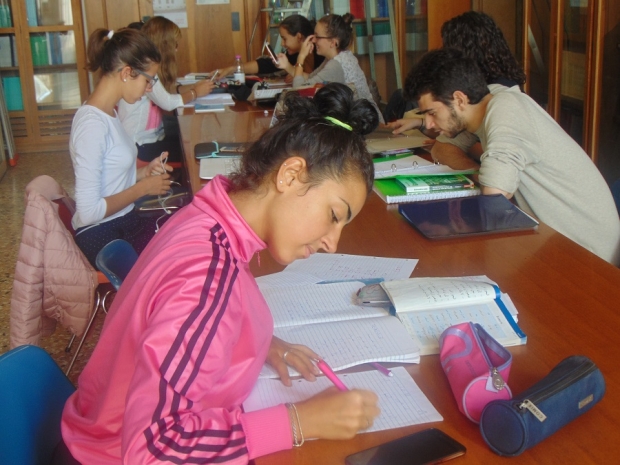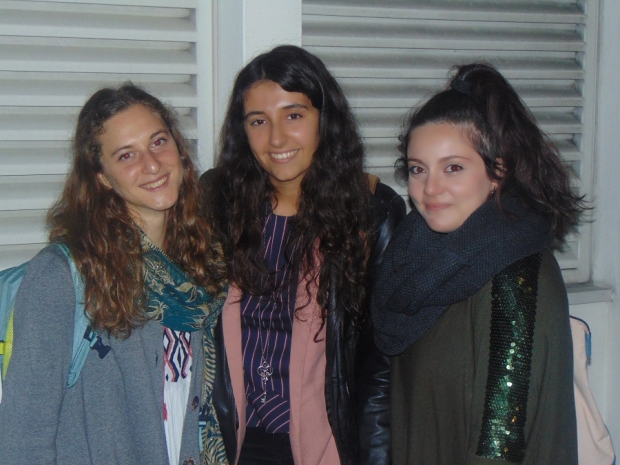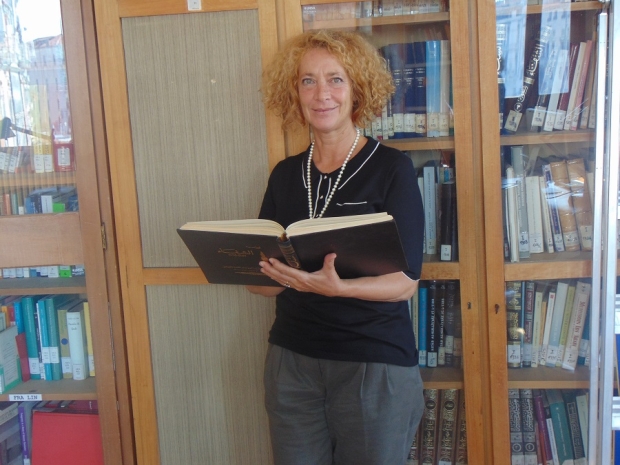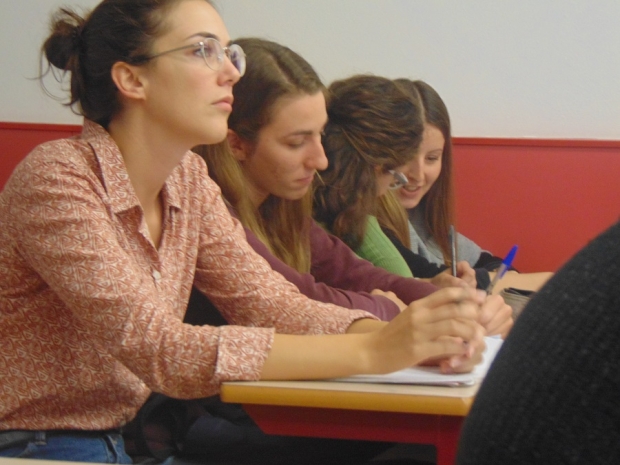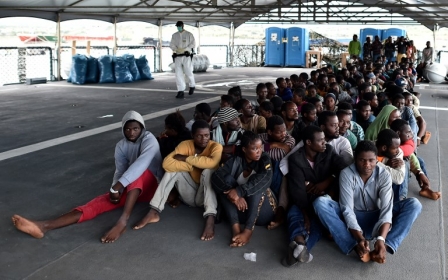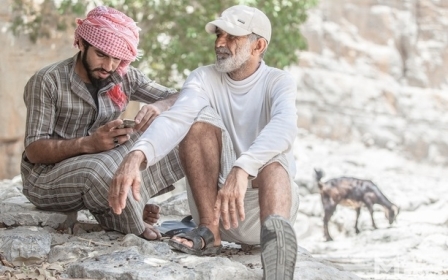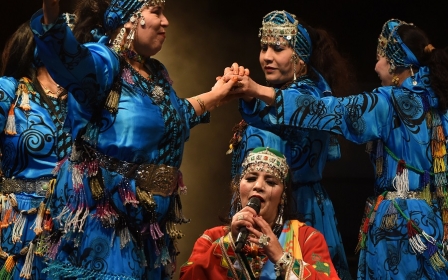More Italian students learning Arabic to better understand the Middle East
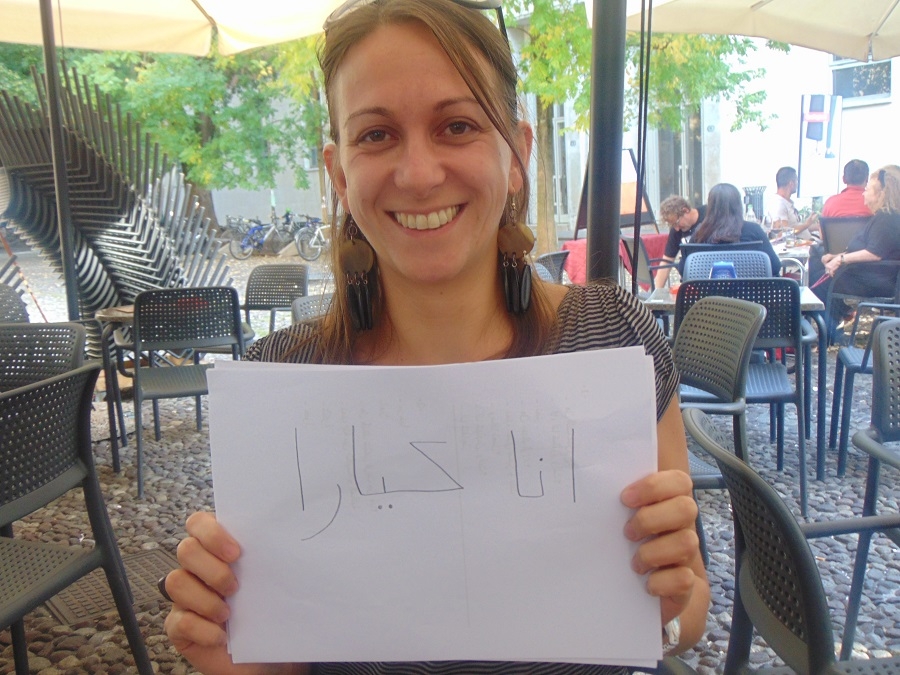
PADUA, Italy - When entering the old wooden gate of the Centre for African and Central Asian Studies at Ca' Foscari University in Venice, there seems to be an overflow of students rushing to get to their classes.
Learning the Arabic language, culture and history is important to understand what is happening in the Arab region
- Laura, student
“We started to focus on political and economic topics that were the [students'] main motivation for learning [Arabic]," Grande told Middle East Eye. Well-known for teaching Arabic in Italy, The Centre for African and Central Asian Studies has branches in Venice, Milan, Naples and Rome.
With news and photos of civil war, turmoil and revolt across the Middle East dominating the news in the last few years, many Italian students became eager to learn Arabic to better understand the region.
In a seminar about Syrian literature in the city of Mestre, near Venice, MEE met with a group of Italian students that had recently began studying Arabic, students such as Laura.
"Learning the Arabic language, culture and history is important to understand what is happening in the Arab region,” Laura said.
"I want to understand what is going on in the Middle East by myself. I do not want to watch television and listen to the radio only. Every media outlet has a different opinion about what is happening now, and Arabic is the door that gives me direct contact with people," Paola explained.
Professors at different language centres in Italy say that the number of students enrolled to learn Arabic doubled in 2015 and then again in 2016.
Arabic is the door that gives me direct contact with people
- Paola, student
“We started Arabic courses in 2014, with two levels - beginners and intermediate students. We had only about 15 students at the centre for each level, but the number doubled in 2015 and also in 2016. The students' ages were different, their specialties and their nationalities were also different, but they had a common goal which is learning more about Arab culture," said Fiona Dalziel, an associate professor and former head of the language centre at Padua University.
“There is a lot of curiosity about the Arab world. People want to know more about Arabs who live here and about their culture. They feel like they cannot always trust what they read and see in media, which try to show the Islamic and Arab world in negative way," she added.
Building bridges
With many Middle Eastern immigrants attempting to reach Europe, fleeing war, oppression and deteriorating economies, in the last few years, many people have found themselves living side by side with Arab nationals, with very little knowledge about their language and culture.
More than 120,000 people have arrived in Europe by sea so far this year. About 82 percent of all migrants have travelled to Italy from Libya. In Italy, the number of Egyptian immigrants almost doubled from 2012, up to 112,765 people in 2017. According to official statistics, the number of Moroccans living in Italy in 2017 is 420,650.
For Ilaria Balbo, a Padua native, her love for Egypt prompted her to study Arabic last year at Ca' Foscari University, in addition to her will to understand Arab communities living in Italy.
There is a lot of curiosity about the Arab world; people want to know more about Arabs who live here and about their culture
- Fiona Dalziel, associate professor
"In addition to being part of my university studies as a student of Egyptology, I have always wanted to go to Egypt because of my admiration for the country which has a great and ancient history. Also, it was necessary to understand more about Arab culture, especially in the presence of a large percentage of Arabs living in Italian society. I finished the first level and I will continue with the next one," Balbo told MEE.
Another student, Stefania, began studying Arabic three years ago. She wanted to better understand the culture and the people she grew up with, having been raised in a neighbourhood inhabited mostly by Arab immigrants.
"Since my childhood, Arab music and Arab vocabulary have been around me all the time. I decided to study Arabic so that I could better understand the culture of those around me and those I grew up with," said Stefania.
"I remember very well how the number of students doubled who wanted to learn Arabic after the terrorist attacks in America on September 11, 2001, Battista said. "The desire to understand Arab society in particular and the Muslim community in general was clear. The same happened here in the centre of Ca' Foscari after the beginning of the Arab revolutions; most of our students are political science and history students who are interested in Middle East affairs."
I decided to study Arabic so that I could better understand the culture of those around me and those I grew up with
- Stefania, student
The Arabic language centre at Ca 'Foscari established an Arabic library in 2005, after the death of Dutch professor Donazione Bonebakker. Bonebakker had donated his entire Arabic library to the centre.
It hosts various books for learning classical Arabic and different dialects like Syrian and Egyptian dialects. The cultural section also includes a collection of famous books on Arab heritage, history, and poetry, in addition to copies of the Quran.
As a student of development at the University of Padua, Chiara Dall'Osto started learning Arabic in 2004. Part of her programme was to study another language in addition to English. An interest in Palestine during the Second Intifada from 2000-2005 was what drove her to choose Arabic.
“What was happening in Palestine at that time made me think of travelling there to work with a non-governmental relief organisation," Dall'Osto said. "It was strange to learn Arabic at that time. I remember that we were only a few students, and we were attending classes in the professor's office. Learning Arabic was not common, but for me, it was necessary to learn Arabic in order to learn more about the Arab world and its culture."
Centre for cultural exchange
Over time, Venice has been an important centre for cultural exchange because of its position in the Mediterranean, creating a bridge between Europe and the East.
Yana Záliv, a Czech student studying history at the University of Oslo, said that she came to Ca' Foscari to learn Arabic because she was fascinated by Arabic culture and history.
"Arab history is a fascinating and ancient history. For me, learning Arabic is an effective way to better understand Arab history, particularly by reading many historical references and manuscripts," she said.
Laura Cecchin is a student from the northeastern Italian city of Campodarsego. She has been studying Arabic at the University of Venice since 2011, following the Arab revolutions.
"I dream of creating a school to teach Arabic literature to children in Italy," she said.
New MEE newsletter: Jerusalem Dispatch
Sign up to get the latest insights and analysis on Israel-Palestine, alongside Turkey Unpacked and other MEE newsletters
Middle East Eye delivers independent and unrivalled coverage and analysis of the Middle East, North Africa and beyond. To learn more about republishing this content and the associated fees, please fill out this form. More about MEE can be found here.


